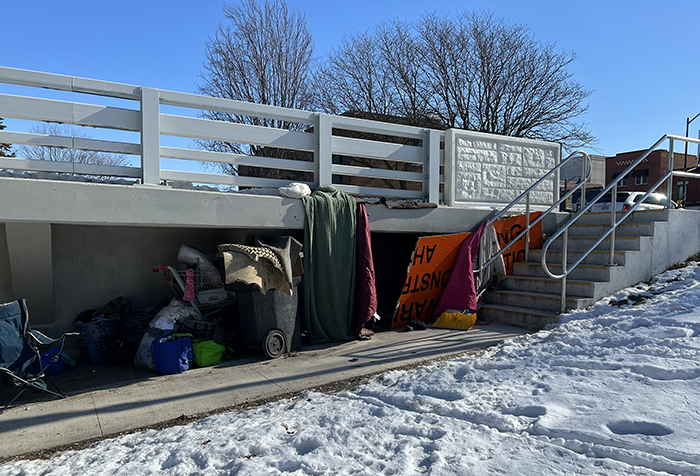
By Pam Wright
Local Journalism Initiative Reporter
Chatham-Kent has decided to move forward to create a 50-tiny-cabin development to help address the ongoing homelessness problem.
At their mid-January meeting, council voted to approve the model with the aim of providing transitional housing to residents that find themselves in need of shelter.
The 100-square-foot cabins, constructed out of shipping containers, arrive fully equipped and ready to go. Built by NOW Housing, the cabins are portable and can be moved to different sites as needed. Chatham-Kent will join Peterborough and the Region of Waterloo, which have cabin developments in place.
Council’s decision followed a detailed report by Josh Myers, C-K’s director of operations for housing services. The report compared the cost of constructing a fixed bunkhouse-style congregate living structure to the cabin concept.
Building and staffing a two-storey congregate homeless facility is more expensive than the cabin model and not recommended, Myers said.
The capital cost for 50 residential cabins and support structures is $1.93 million, plus $650,000 for delivery and installation.
The fully furnished cabins include a bed frame, mattress, mini-fridge, table and chair, shelving, air conditioning and heating and they can be locked. There will be additional costs for site readiness and preparation.
Approximate annual staffing and security costs for the cabin complex are $2.37 million.
Revenue will also be generated from residents who will pay a small sum for rent.
Myers stressed that residents won’t be staying in the cabins long term.
To qualify, he said, there’s an expectation the participants will work with community partners to transition out of the space “as soon as possible.”
Staff from the Canadian Mental Health Association and the Chatham-Kent Community Health Centre will be offering services on site as well.
The municipality has done their homework on the issue, visiting the Waterloo site and gleaning information from engaged stakeholder groups and more than 120 people with lived experience in homelessness.
Myers said the cabin arrangement is cheaper and comes with the added advantage of being able to be upsized or downsized if necessary.
Plus, he said, it affords more privacy for the resident, allows couples to stay together, adds increased safety and also allows people to keep their pets, which can’t be done under the current model at Victoria Park Place.
Because of the chronic shortage of available housing and runaway rent costs, the municipality is also working on a secondary housing plan.
Currently, Myers said there are 2,400 C-K households dependent on Ontario Works to survive, and the waitlist for affordable housing sits at 1,038, compared to 717 in 2021.
Modular or tiny homes could be a solution. The NOW Housing company has delivered a quote to Chatham to provide 20 units for bachelor-style tiny homes that include a bathroom and a kitchenette for $2.7 million.
It means Chatham-Kent could acquire 50 units for the same price as a 20-unit traditional build, Myers said, as the current cost to build a one-bedroom unit is $400,000.
It’s critical to consider the options as there are currently 200 households in Chatham-Kent with nowhere to live, Myers stressed, adding that community partnerships and locations from across the municipality will be explored and brought back before council.
North Kent Coun. Jamie McGrail, who has toured the Waterloo site, said she thinks the cabin concept is a good option.
“It gives people a sense of ownership, “McGrail said, adding the fact that it is portable and that people can bring their pets are plus factors.
Chatham Coun. Marjorie Crew said she’s happy to see the proposal.
“I think the cabin way is the way to go,” Crew said, adding the proposal offers people dignity as they face the trauma of homelessness.
“It gives them the opportunity to recover from homelessness.”
South Kent Coun. Anthony Ceccacci concurred.
Ceccacci said the current surge in homelessness hasn’t been seen before and is particularly challenging for rural communities.
“This is somewhat of a temporary solution to help,” he added. “It is a band-aid, but it is treating an open wound.”
Myers pointed out that shelters won’t end homelessness as the answer lies in the availability of funding for affordable housing from upper levels of government.
“Our vision is that every household in Chatham-Kent has a place to call home,” Myers told council. “We believe that these two approaches will get C-K closer to that vision.”
No properties have been selected for either proposal and final decisions must come back before council. Requests for proposals are now going out.
Several deputations were brought forward in support of the cabin concept.







Congratulations to C-K Council for their support towards the tiny cabin solution for homelessness in this region. It’s workable and is a fantastic prospective development to take place!! Added gratitude is deserved to the founder of the local concept for cabin homes.